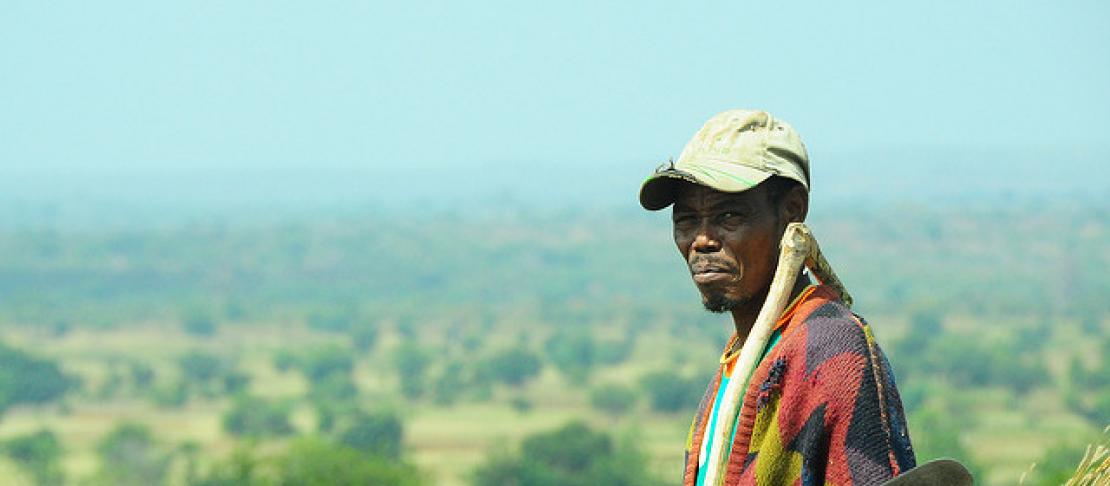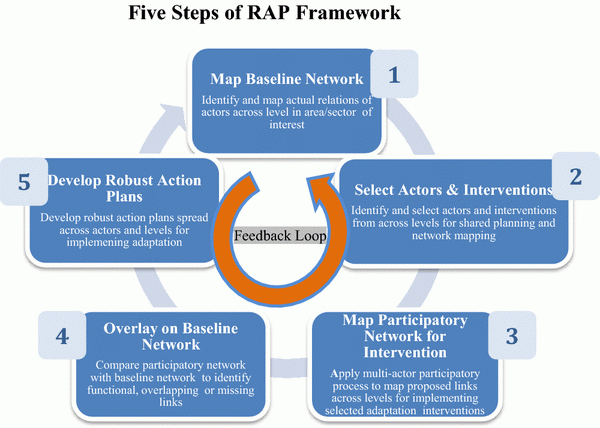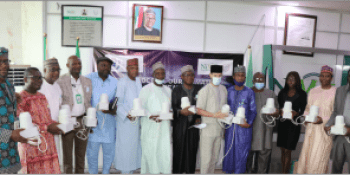Robust Adaptation Planning: a five-step framework to plan and respond to climate change

Developing robust adaptation plans for Ghana’s agricultural climate change regime.
On a hot summer day in Accra, a number of people starting descending at the Ghana Institute of Management and Public Administration (GEMPA) on the outskirts of the city. This was not an ordinary group but over forty key actors from across Ghana, including government officials, private sector executives, university researchers, NGO officials, donors and smallholder farmers from the North. While they represented different organisations, entities and communities, these actors shared a common goal and agenda: How to plan for the growing and increasingly uncertain challenge of climate change in Ghana’s agriculture systems.
The setting was a participatory workshop convened by researchers from the University of Oxford and the CGIAR Research Program on Climate Change, Agriculture and Food Security (CCAFS) to develop robust adaptation plans in rural Ghana dominated by subsistence smallholders. Agriculture is the mainstay of Ghana’s economy (a lower middle-income country), occupying over half of its population, mostly as smallholder farmers. The participants piloted a five-step scheme (developed by the research team), namely the Robust Adaptation Planning (RAP) framework, within Ghana’s agricultural regime, to demonstrate its usefulness for planning practical interventions for climate-vulnerable people involving multiple actors and levels.
Robust Adaptation Planning framework
At the heart of RAP lies a participatory approach that promotes a collective response from diverse actors to plan, sequence and time strategies across many levels (i.e. from local to national). The participants identify adaptation interventions and important relations to develop wide networks, highlighting pathways for connecting central policy to local implementation and vice versa. By comparing these proposed participatory structures with those actually existing on the ground, RAP identifies effective actors that are important for delivering adaptation, as well as the gaps and overlaps in actor relations/linkages. This results in a robust plan that cover all the important bases.

Read the article: Applying the robust adaptation planning (RAP) framework to Ghana’s agricultural climate change adaptation regime
The results from the workshop, part of the broader Oxford-CCAFS study in developing countries were recently published in a new article in Sustainability Science: Special Feature: Sustainability Science for Meeting Africa’s Challenges.
The workshop participants piloted the RAP framework on two adaptation interventions: Agriculture Information Management System (AIMS) and Sustainable Agriculture Inputs (SAI). These interventions focus directly on the key challenges identified by the local farmers in the workshop, address issues of adaptation to climate change, and require cross-level effort through many actors.
While it is hard to quantify the time, resources and human commitment to implement RAP, because they vary with the nature and context of the setting, they can be substantial. In our case, RAP required a few months of primary data collection to identify actor relations and local challenges, planning workshops (including selecting and inviting participants), developing adaptation interventions with expert input for RAP applications ,and securing the financial commitment of the hosting community and RAP workshops.
Robust Adaptation Planning application results
Our results from piloting the RAP framework demonstrate that the responsibility to plan and implement adaptation actions lies beyond the remit of a single actor (e.g., the national government). In some cases, coordinating action is complex, requiring concerted efforts by several actors to establish formal channels of communication through Ghana’s formal administrative structures. While in other cases it is simply bringing together disconnected actors (across and between the national to the local level) to take action. Using existing networks and actors engenders the necessary collaborative understanding and vision to motivate collective action that promotes unity, coherence, empowerment, efficiency and effectiveness. By adopting a participatory approach across all levels, a shared understanding of adaptation is developed, with strong ownership of the process, exemplified by the robust adaptation plans developed for AIMS and SAI by the participants of the RAP workshop.
Robust Adaptation Planning elements
The RAP highlighted three important elements for planning adaptation:
- visualise actions across different planning levels (local to national levels) and actors (policy to local farmers) to reduce the complexity of adaptation responses;
- offer a shared space to actors from different levels to think and create collective narratives for adaptation without demanding explicit consensus;
- identify key actors to allocate roles and responsibility for delivering effective adaptation plans through a collaborative process.
By the end of the RAP process, participants are clear on what actions are needed and who has responsibility for each.
Our application of RAP also demonstrates that robust action is essential to address the complexities of climate change by balancing the need for short-term responses and adapting to the long-term consequences. The RAP framework offers a valuable tool to policymakers, planners and other stakeholders to develop deliverable plans that involve many actors spread across a whole country. However, as the RAP framework is new and evolving, more applications (i.e. case studies) are needed in different settings, sectors, and geographic contexts to prove its broader utility.
On conclusion of the workshop, the participants headed back to their organizations, entities and communities in different directions across Ghana. The promising performance of RAP shows that it is a useful tool worthy of more attention. However, no one can escape the fact that successfully coping with the consequences of climate change will require considerable ongoing commitment, rigour, imagination, flexibility and effort by the participants.
Read more:
- Chaudhury AS, Thornton TF, Helfgott A, Sova C. 2017. Applying the robust adaptation planning (RAP) framework to Ghana’s agricultural climate change adaptation regime. Sustainability Science 1-20.
Abrar Chaudhury is a Postdoctoral researcher at the Said Business School, University of Oxford.



